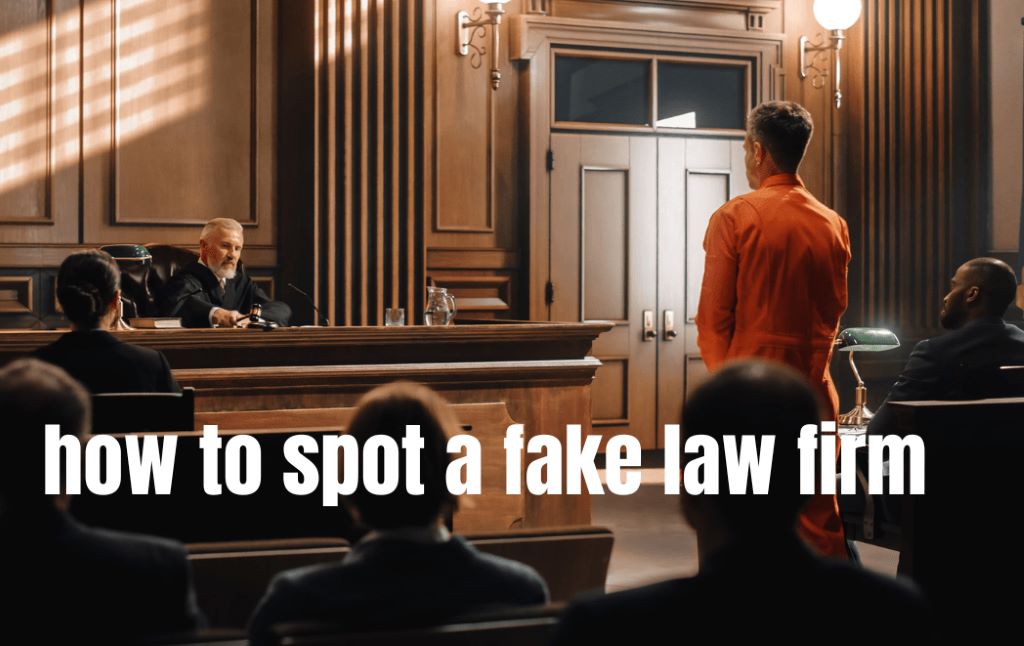
22 Dec How to Spot a Fake Law Firm
Have you ever been in a situation where you require legal assistance but find yourself inundated with innumerable ads and websites asserting themselves as genuine law firms? The experience can be quite overwhelming and confusing as it becomes challenging to distinguish between legitimate and fraudulent legal entities. It’s imperative to identify fake law firms to safeguard your interests and avoid any loss or damage. We will provide you with comprehensive guidance on how to spot a fake law firm to help you make informed decisions.
1. Research the Law Firm

When you’re in the process of evaluating a law firm’s authenticity, the first step is to conduct a thorough investigation of the firm. To begin with, examine the law firm’s website closely and pay attention to any warning signs. Does the website have a polished and professional appearance? Is there a physical address and contact information? Genuine law firms generally have a high-quality online presence and offer comprehensive information about their legal practitioners and services.
Furthermore, it is important to check if the law firm is registered and licensed to practice law in your jurisdiction. Most countries have an official register or directory of lawyers where you can verify the credentials of a law firm. If you cannot find the law firm listed, or if their contact information does not match the official records, it could be a sign of a fake law firm.
2. Check for Reviews and Testimonials
If you’re looking for a law firm to represent you, it’s important to choose one with a strong reputation and a track record of success. One way to gauge a firm’s credibility is to read reviews and testimonials from previous clients. Online platforms like Google, Yelp, and Avvo are great resources for finding such reviews. To get a comprehensive understanding of a firm’s reputation, it’s important to read both positive and negative reviews. Positive reviews can give you a sense of the firm’s strengths and the types of cases they handle well. Negative reviews, on the other hand, can alert you to potential issues and allow you to make a more informed decision about whether the firm is right for you. So, take the time to read through reviews carefully and consider them as part of your decision-making process.
Keep in mind that no law firm is perfect, and it is not uncommon for legitimate firms to have a few negative reviews. However, if you notice a pattern of complaints such as unresponsive lawyers, unethical practices, or unfulfilled promises, it may be a warning sign that the law firm is not genuine.
3. Look for a Physical Presence
A legitimate law firm typically has a physical office where clients can meet with their attorneys. If the law firm does not provide a physical address or only has a virtual office, it may indicate that they are not a real law firm. Fake law firms often operate solely online and use virtual addresses to give the appearance of legitimacy.
If it’s feasible, I would recommend visiting the law firm’s physical office to verify its existence. Take note of the surroundings and overall impression of the office. Is it a well-maintained and professional environment? Do you see any other employees or clients present? You should always trust your instincts; if something seems off or feels uncomfortable, it’s best to be cautious.
4. Verify the Lawyers’ Credentials
One of the most crucial steps in spotting a fake law firm is to verify the credentials of the lawyers associated with the firm. Legitimate lawyers have undergone extensive education and training and are licensed to practice law in their respective jurisdictions. You can usually find information about a lawyer’s credentials on their law firm’s website or by searching their name in the official lawyer directory.
It is important to keep a close eye on the statements made by lawyers and take note of any differences or contradictions. In particular, if a lawyer asserts that they have completed their education at a well-known and reputable university, but there is no evidence to support this claim, it may indicate that the law firm they belong to is not legitimate and could be a fraudulent entity. Therefore, in order to safeguard oneself from such fraudulent activities, it is necessary to be vigilant and scrutinize all the information provided by the lawyers closely.

5. Be Wary of Unusual Payment Requests
Another red flag to watch out for is unusual payment requests or demands. Fake law firms often use deceptive tactics to extract money from unsuspecting individuals. They may ask for large upfront fees or insist on cash payments. Legitimate law firms typically have transparent fee structures and provide invoices for their services.
If you’re dealing with a law firm and they request payment through unconventional methods like wire transfers, prepaid gift cards, or cryptocurrency, you should be on high alert. These methods are not only unorthodox but can also raise suspicions regarding the legitimacy of the payment request. To avoid falling victim to fraudulent activities, always double-check the authenticity of payment requests with reliable sources such as official law society websites or your local bar association. It’s better to be safe than sorry.
Frequently Asked Questions
- How do I know if a law firm is licensed to practice law?
You can usually verify the license of a law firm by checking your country’s official register or directory of lawyers. This will provide you with information about the lawyers’ credentials and whether they are eligible to practice law.
- Can a law firm operate solely online without a physical office?
While it is possible for legitimate law firms to have a virtual presence, it is always advisable to verify their physical existence. A lack of a physical office or a solely virtual address should raise suspicions and prompt further investigation.
- Are online reviews reliable in determining a law firm’s credibility?
Online reviews can provide valuable insights into a law firm’s reputation, but it is important to use them as a reference rather than a definitive judgment. Consider both positive and negative reviews, and look for patterns or consistent feedback that may indicate the credibility of the law firm.
- What should I do if I suspect a law firm is fake?
If you suspect that a law firm is fake, it is important to report your suspicions to the relevant authorities. Contact your local legal regulatory body or bar association and provide them with the necessary information, including the law firm’s name and details of your interactions with them.
- How can I avoid falling victim to a fake law firm?
To avoid falling victim to a fake law firm, conducting thorough research, checking for reviews and testimonials, verifying the lawyers’ credentials, looking for a physical presence, and being wary of unusual payment requests is essential. Trust your instincts, and when in doubt, seek advice from trusted legal professionals or organizations.
Conclusion
Spotting a fake law firm can be challenging, but with careful research and vigilance, you can protect yourself from potential scams and fraudulent practices. When learning how to manage a small law firm, it is crucial to prioritize the verification of credentials, checking reviews and testimonials, and exercising caution regarding any unusual payment requests. By adhering to these guidelines, you can guarantee that your legal matters are entrusted to a legitimate and trustworthy law firm.


No Comments